Comprehensive Guide to Garden Maintenance in Ben Gardening
Introduction to Garden Maintenance
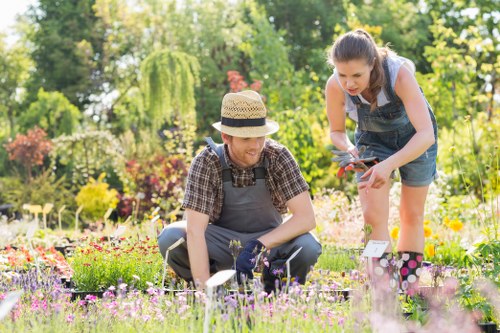
Maintaining a beautiful garden requires dedication, knowledge, and the right tools. In Ben Gardening, we understand the unique challenges that come with caring for gardens in this region. Whether you're a seasoned gardener or a beginner, our comprehensive garden maintenance services are tailored to keep your outdoor space flourishing all year round.
Proper garden maintenance not only enhances the aesthetic appeal of your property but also promotes a healthy ecosystem. From pruning and weeding to fertilizing and pest control, each task plays a vital role in ensuring your garden remains vibrant and resilient.
In this guide, we will explore the essential aspects of garden maintenance in Ben Gardening, providing you with valuable insights and practical tips to achieve a stunning garden. Our step-by-step approach will help you understand the best practices and the importance of regular maintenance.
Seasonal Garden Maintenance
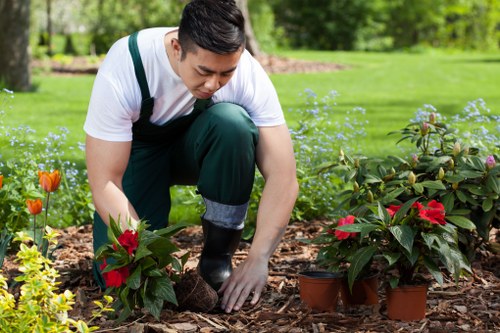
Gardens are dynamic systems that change with the seasons. Each season brings its own set of challenges and opportunities for garden maintenance. Understanding how to care for your garden throughout the year is crucial for sustaining its health and beauty.
Spring Maintenance
Spring is a time of renewal and growth. As temperatures rise and days get longer, your garden becomes a hub of activity. Key spring maintenance tasks include:
- Pruning: Removing dead or damaged branches from trees and shrubs promotes healthy growth.
- Soil Preparation: Testing and amending the soil ensures it has the right nutrients for your plants.
- Planting: Spring is ideal for planting new flowers, vegetables, and trees.
- Mulching: Applying mulch helps retain soil moisture and suppress weeds.
By addressing these tasks in spring, you set the foundation for a thriving garden throughout the warmer months.
Proper Watering Techniques

Watering is a fundamental aspect of garden maintenance. However, overwatering or underwatering can be detrimental to plant health. Implementing proper watering techniques ensures that your plants receive the right amount of moisture.
Understanding Your Garden's Water Needs
Different plants have varying water requirements. It's essential to group plants with similar needs together to simplify your watering routine. Factors such as soil type, climate, and plant species influence how much water your garden requires.
Tips for Efficient Watering
- Water Early in the Morning: This reduces evaporation and allows plants to absorb moisture before the heat of the day.
- Use Drip Irrigation: This method delivers water directly to the plant roots, minimizing waste.
- Mulch: Adding mulch around plants helps retain soil moisture and reduces the frequency of watering.
- Monitor Soil Moisture: Regularly check the soil to ensure it's moist but not waterlogged.
By adopting these practices, you can maintain an optimal watering schedule that supports plant health and conserves water.
Pest and Disease Management
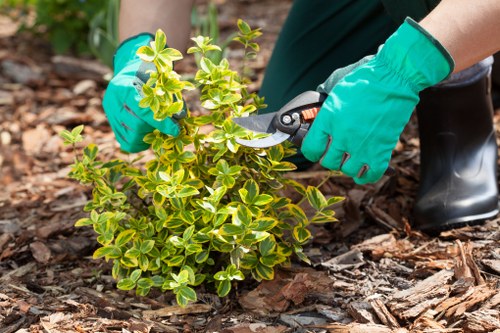
Pests and diseases can pose significant threats to your garden's health. Effective management strategies are essential to prevent infestations and maintain a thriving garden environment.
Identifying Common Pests
Understanding the types of pests that commonly affect gardens in Ben Gardening helps in implementing targeted control measures. Common garden pests include:
- Aphids: These small insects feed on plant sap, causing leaves to curl and stunt growth.
- Slugs and Snails: They feed on a variety of plants, leaving unsightly holes and trails.
- Spider Mites: These tiny arachnids cause stippling and yellowing of leaves.
Preventive Measures
Preventing pest infestations is more effective than dealing with them after they occur. Some preventive measures include:
- Regular Inspection: Regularly check your plants for signs of pests or diseases.
- Healthy Soil: Maintaining healthy soil promotes robust plant growth, making plants less susceptible to pests.
- Natural Predators: Encourage beneficial insects like ladybugs and lacewings that prey on harmful pests.
- Proper Sanitation: Remove fallen leaves and debris that can harbor pests.
Implementing these strategies helps keep your garden pest-free and healthy.
Pruning and Trimming Techniques
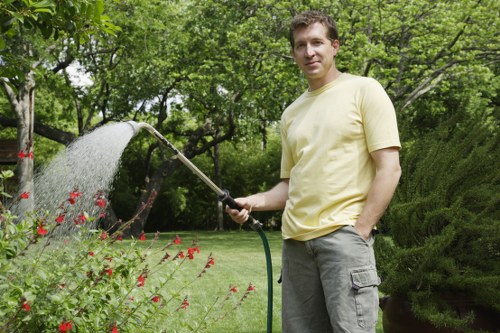
Pruning and trimming are essential for maintaining the shape, health, and productivity of plants. Proper techniques ensure that plants grow in a balanced manner and prevent disease and pest issues.
When and How to Prune
Different plants require pruning at different times of the year. Understanding the appropriate timing and methods for each plant type is crucial.
Step-by-Step Pruning Guide
- Assess the Plant: Identify dead, diseased, or damaged branches.
- Use the Right Tools: Ensure your pruning tools are sharp and clean to make precise cuts.
- Make Clean Cuts: Cut at a 45-degree angle just above a bud or node.
- Remove Thinning: Thin out dense areas to improve air circulation and light penetration.
- Shape the Plant: Trim branches to maintain the desired shape and size.
Regular pruning promotes healthy growth and enhances the overall appearance of your garden.
Soil Health and Fertilization
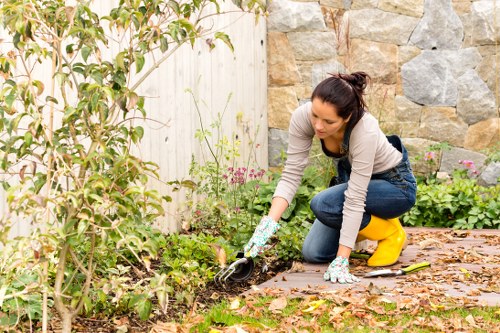
Healthy soil is the foundation of a thriving garden. It provides essential nutrients, supports root growth, and facilitates water retention. Proper soil management and fertilization are key components of garden maintenance.
Testing and Amending Soil
Conducting soil tests helps determine its pH level and nutrient content. Based on the results, you can amend the soil to create an optimal environment for your plants.
Types of Fertilizers
- Organic Fertilizers: These include compost, manure, and bone meal, which improve soil structure and provide slow-release nutrients.
- Inorganic Fertilizers: These synthetic fertilizers offer immediate nutrient availability but may require careful application to avoid over-fertilization.
- Liquid Fertilizers: Ideal for foliar feeding, they provide quick nutrient uptake for plants.
Choosing the right fertilizer and applying it correctly ensures your plants receive the necessary nutrients for optimal growth.
Weeding and Mulching Strategies
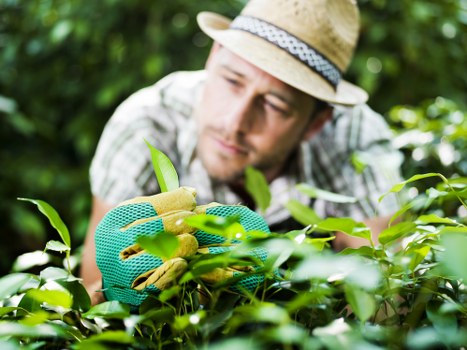
Weeds compete with your garden plants for nutrients, water, and sunlight, potentially hindering their growth. Effective weeding and mulching strategies are essential for maintaining a healthy garden.
Effective Weeding Techniques
Regular weeding prevents weeds from establishing and spreading. Here are some effective techniques:
- Hand Weeding: Ideal for small gardens, it allows for precise removal of weeds without disturbing surrounding plants.
- Hoeing: This mechanical method is suitable for larger areas, cutting weeds off at the soil surface.
- Natural Weed Killers: Use vinegar or boiling water as eco-friendly alternatives to chemical herbicides.
Benefits of Mulching
Mulching offers several advantages, including:
- Moisture Retention: Mulch helps keep the soil moist, reducing the frequency of watering.
- Weed Suppression: A layer of mulch blocks sunlight, preventing weed seeds from germinating.
- Temperature Regulation: Mulch insulates the soil, protecting plant roots from extreme temperatures.
- Soil Improvement: Organic mulches decompose over time, enriching the soil with nutrients.
Incorporating mulching into your garden maintenance routine enhances soil health and reduces weed growth.
Lawn Care and Maintenance

A well-maintained lawn adds value and beauty to your property. Proper lawn care requires regular mowing, fertilizing, aerating, and pest control.
Routine Lawn Maintenance Tasks
To keep your lawn healthy, incorporate the following tasks into your maintenance schedule:
- Mowing: Regular mowing at the correct height promotes dense and healthy grass growth.
- Fertilizing: Apply lawn-specific fertilizers to provide essential nutrients.
- Aerating: Soil aeration improves root growth and enhances nutrient and water uptake.
- Overseeding: Planting grass seeds fills in bare spots and improves lawn density.
Choosing the Right Grass Type
Selecting a grass type suited to Ben Gardening's climate ensures a resilient and attractive lawn. Consider factors like sun exposure, water availability, and foot traffic when choosing grass varieties.
With consistent care, your lawn will remain lush, green, and a beautiful centerpiece of your garden.
Hardscape Maintenance

Hardscape elements like patios, walkways, and fences play a significant role in your garden's overall design. Proper maintenance of these structures ensures they remain functional and aesthetically pleasing.
Cleaning and Repairing Hardscape Features
Regular cleaning prevents the buildup of dirt, mold, and algae on hardscape surfaces. Here are some maintenance tips:
- Power Washing: Remove stubborn stains and debris from patios and walkways using a power washer.
- Sealants: Apply sealants to concrete or stone surfaces to protect them from weather damage.
- Repairing Cracks: Promptly fix cracks in walkways and patios to prevent further deterioration.
- Maintaining Fences: Regularly inspect fences for damage and apply paint or stain to preserve their appearance.
Maintaining hardscape features enhances the durability and visual appeal of your garden structures.
Garden Tools and Equipment
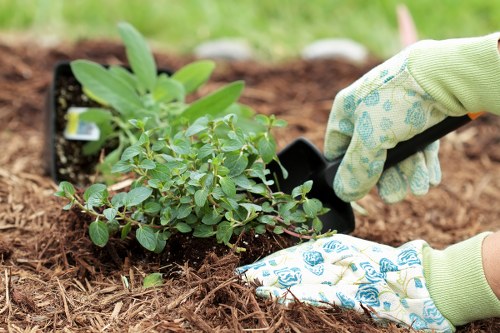
Having the right tools and equipment is essential for efficient garden maintenance. Quality tools not only make tasks easier but also contribute to better results.
Essential Garden Tools
Equip your garden maintenance toolkit with the following essentials:
- Pruners and Shears: For precise pruning and trimming of plants.
- Shovels and Spades: Useful for digging, planting, and soil preparation.
- Rakes: Ideal for leveling soil, removing debris, and spreading mulch.
- Watering Equipment: Hoses, sprinklers, and watering cans ensure efficient watering.
- Lawn Mowers: Keep your lawn neat and well-trimmed.
Maintenance of Garden Tools
Proper maintenance of your garden tools extends their lifespan and ensures they perform optimally. Regularly clean, sharpen, and store tools in a dry place to prevent rust and damage.
Investing in quality tools and maintaining them diligently enhances your garden maintenance experience.
Organic Gardening Practices
[IMG_11]Adopting organic gardening practices promotes a healthy and sustainable garden environment. Organic methods reduce the reliance on chemical fertilizers and pesticides, fostering biodiversity and soil health.
Composting
Composting transforms kitchen waste and garden debris into rich, organic matter that enhances soil fertility. Benefits of composting include:
- Soil Enrichment: Compost adds essential nutrients to the soil.
- Improved Soil Structure: It enhances soil aeration and water retention.
- Waste Reduction: Composting reduces the amount of waste sent to landfills.
Natural Pest Control
Using natural pest control methods minimizes environmental impact and preserves beneficial insect populations. Strategies include:
- Introducing Beneficial Insects: Ladybugs and predatory beetles help control pest populations.
- Crop Rotation: Changing plant locations prevents the buildup of pests and diseases.
- Handpicking: Manually removing pests from plants is an effective control method.
Embracing organic gardening practices leads to a more resilient and eco-friendly garden.
Landscape Design and Planning
[IMG_12]Effective landscape design enhances the functionality and beauty of your garden. Thoughtful planning ensures that your garden meets your aesthetic preferences and practical needs.
Creating a Garden Layout
Start by assessing your garden space and determining its potential. Consider factors such as sunlight exposure, soil type, and existing plantings. Develop a layout that incorporates focal points, pathways, and planting beds.
Selecting Plants and Features
Choose plant species that thrive in Ben Gardening's climate and complement each other in terms of color, size, and texture. Incorporate features like benches, fountains, and garden lighting to enhance the ambiance and functionality of your outdoor space.
A well-designed landscape not only looks appealing but also provides a harmonious environment for plants and wildlife.
Regular Garden Inspections
[IMG_13]Conducting regular garden inspections helps identify potential issues early, ensuring timely intervention and maintenance. Inspections should cover all aspects of the garden, including plant health, soil condition, and structural elements.
What to Look For
During inspections, pay attention to the following:
- Signs of Disease: Look for discoloration, wilting, or unusual growth patterns in plants.
- Pest Infestations: Check for the presence of insects, larvae, or damage caused by pests.
- Soil Health: Assess soil moisture levels, compaction, and nutrient content.
- Structural Integrity: Inspect hardscape features for cracks, erosion, or other damage.
Benefits of Regular Inspections
Regular inspections allow you to maintain your garden proactively, preventing minor issues from escalating into major problems. This approach ensures a healthy and vibrant garden throughout the seasons.
Utilizing Professional Garden Maintenance Services
[IMG_14]While DIY garden maintenance can be rewarding, professional services offer expertise and efficiency that can significantly enhance your garden's health and appearance. Ben Gardening's team of experienced horticulturists provides comprehensive maintenance solutions tailored to your garden's unique needs.
Advantages of Hiring Professionals
Professional garden maintenance services offer several benefits, including:
- Expert Knowledge: Professionals understand the local climate, soil conditions, and plant species, ensuring optimal care.
- Time Efficiency: Outsourcing maintenance frees up your time to enjoy your garden without the hassle of upkeep.
- Customized Care Plans: Services are tailored to address specific garden needs, promoting long-term health and sustainability.
- Access to Specialized Tools: Professionals have the necessary tools and equipment for effective maintenance tasks.
Choosing the Right Service Provider
Select a reputable garden maintenance service that aligns with your garden's requirements and your personal preferences. Look for providers with positive reviews, comprehensive service offerings, and a commitment to quality.
Investing in professional maintenance ensures your garden remains a beautiful and thriving sanctuary.
Eco-Friendly Gardening Practices
[IMG_15]Adopting eco-friendly gardening practices contributes to environmental sustainability and creates a healthier garden ecosystem. Implementing green methods reduces your garden's ecological footprint and fosters biodiversity.
Rainwater Harvesting
Collecting and utilizing rainwater for your garden reduces dependence on municipal water sources and conserves water. Set up rain barrels or underground tanks to capture runoff from rooftops and other surfaces.
Benefits of Rainwater Harvesting
- Water Conservation: Saves water for times of scarcity and reduces water bills.
- Improved Plant Health: Rainwater is free of chemicals like chlorine and fluoride, making it ideal for plants.
- Reduced Erosion: Capturing runoff prevents soil erosion and protects your garden's foundation.
Composting and Organic Matter
Incorporating compost and organic matter into your garden enhances soil health and supports plant growth. Organic matter improves soil structure, increases nutrient availability, and fosters beneficial microorganisms.
By embracing eco-friendly practices, you create a sustainable and resilient garden that benefits both your household and the environment.
Conclusion
[IMG_16]Effective garden maintenance in Ben Gardening requires a combination of knowledge, effort, and the right strategies. By following the practices outlined in this guide, you can cultivate a thriving and beautiful garden that brings joy and tranquility to your life.
Whether you choose to maintain your garden yourself or seek professional services, prioritizing regular maintenance ensures the longevity and vitality of your outdoor space.
Embrace the art of garden maintenance and transform your garden into a lush, vibrant sanctuary.
Ready to transform your garden? Contact us today to book your garden maintenance service and experience the best in Ben Gardening.
